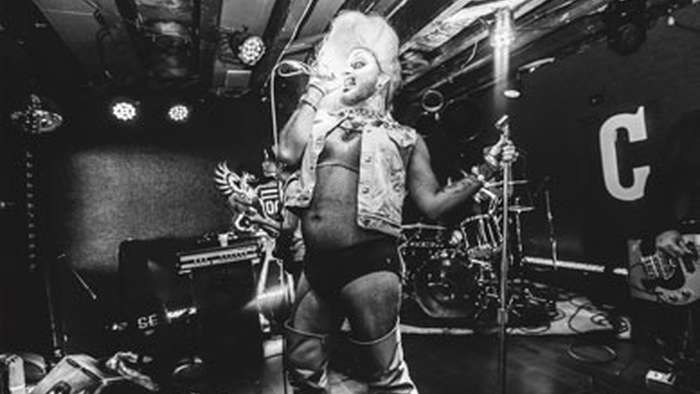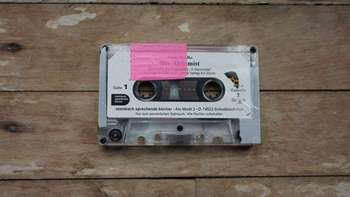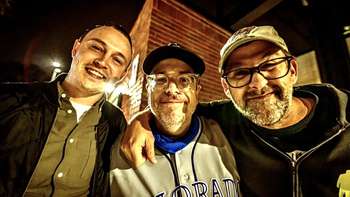Amy Oden is a Baltimore-based musician and filmmaker. Her work includes the feature documentaries From the Back of the Room and Exotic, short-form documentaries for Maryland Public Television, and more, as well as playing in queer punk band Homosuperior. She has contributed guest columns in the past concerning her take on DIY culture, international subcultures, and more. This time, the topic turns to subculture overlap and divide in DC. Amy frequently goes by her nickname KC, which is how she’s identified in the interview below.
--
Homosuperior has been an active band for just over three years. We’re from DC, but I (the bassist) live in Baltimore. We’ve done a few tours and put out a few tracks during that time, but I think most people who know our band primarily like seeing us live.
I’m a filmmaker and journalist “by trade,” and I work for the PBS affiliate up here with some independent video work on the side. Our guitarist Farrah is also a working photographer, in addition to taking some sick pictures at shows. Our drummer, Kit (ironic, I know) works for a collectively-owned dog walking company in DC. Last but certainly not least, our singer Josh, who performs as Donna Slash, runs Gay Bash, an alt-drag party in DC. Did I mention we were fronted by a drag queen?
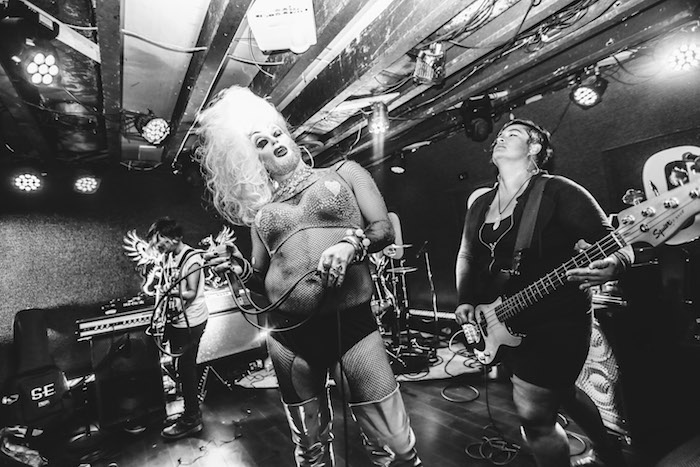
Homosuperior
We got together to talk about the band, sexuality and music, and our times of political crisis a few weeks ago. Since I’m in the band, I structured this “interview” as being more of a collaborative discussion. I thought we could start by talking about our formation…
Josh: There wasn’t any angry, sloppy, snotty punk in this area, and I felt like we needed some [and] it needed to be inclusive. Also, doing stuff in the DC gay scene, everything [is] marketed like, “This is what’s cutting edge” and it wasn’t actually dangerous or interesting. So, the band was a reaction to punk being “too hetero[sexual]” and gay being “too heteronormative” in DC.
KC: We’re the only punk band that does stuff in the drag scene [here]. I think that maybe those artistic communities tend to be separate because if you’re working really hard on your drag you’re not going to be working really hard on playing guitar. They’re sort of separate disciplines. Where do we think we fit between those scenes? We play punk shows and drag shows, and we’ve played shows that have melded things. Sometimes we’ve had to be instructive, like “music people - tip the drag queens.” There are cultural norms that people don’t always “get,” and we’re in a funny middle ground.
Kit: I feel like one of the only goals, so to speak, that I personally had with the band was to increase the overlap in that Venn diagram of punk and queer communities.
KC: I think we’re in a time where that’s happening more but I also think there’s a difference between a queer punk and a punk queer. To me, those are the populations that we’re speaking to.
Everyone: uh huh
Josh: Yeah, [when] the Gay Bash girls come to our shows they’re like, “There are so many queer people here that I’ve never seen.”-Well, they don’t all go to bars or to the “gay parties” - lots of them exist in their own world.
Farrah: The “gay parties” aren’t always the “queer parties.”
Josh: Yeah, they’re the gay white men parties.

The Hemlines
Farrah: There’s a gay community in DC but I don’t personally feel like there’s a queer community in DC. Those are two different things.
KC: I feel like these scenes have specific attitudes towards gender, also. How do we feel like punk is “doing” with gender and how is the drag/gay community “doing” with it? Speaking specifically about femme-y-ness, masculinity, and how those traits are treated in either culture. For instance, Julia Serano talks about a lot seeing a lot of the transphobia she experiences as actually just rooted in sexism…
Farrah: I mean, it almost goes without saying that we still see [sexism] in punk. That’s still a predominant attitude -- the women who are respected are the women who are tough. It might be changing a little bit.
KC: Punk is still hyper-masculine. Still. Even if we put women on stage and even if we put queer people on stage, it’s still a very “tough” subculture.
Farrah: I’m sure tons of us were happy to see Limpwrist this year, but even [though] that is very gay, but it’s still real masculine.
KC: This ties into the gay community in DC not valuing femininity.
Josh: That’s a daily problem. Even with hookups on Scruff having somebody come to my house and seeing their face when they come in and see the bras and wigs everywhere. It’s disappointing but it’s definitely a reality. Having to present yourself as gay to your family already is very stressful so like, you need it to be as “normal”-looking as possible for them. So to introduce [a] boyfriend who also does drag is kind of a big thing for people.
KC: Don’t worry we’re still going to get married and adopt.
Josh: Don’t worry while we’re both sucking each other’s dicks we’re totally masculine.
[Laughter]
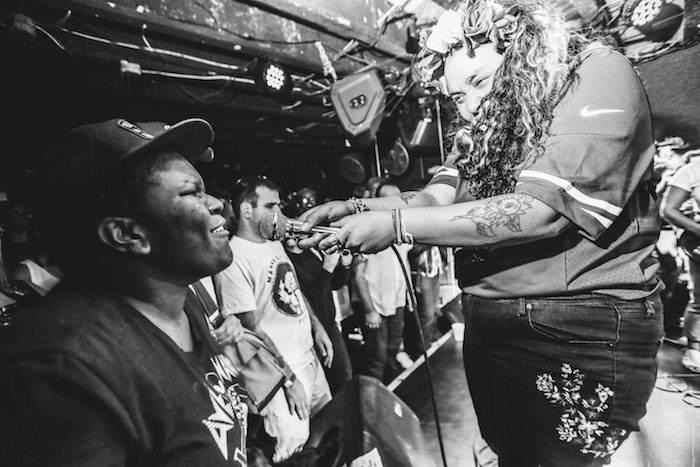
The Downtown Boys
KC: So, how do we feel like the all of this manifests in the band? I feel like it’s political that we take up and make space for queer people to process and to be in the front of the room and emote and dance and have a good time. I see this also as being tied to community and sobriety and mental health. We always hear about both the punk and queer scenes being so surrounded by and steeped in bar culture.
Farrah: We’re kind of creating a temporary space wherever we are [for] people to be who they are. If alcohol and addiction are part of your story and make you anxious about being in a certain space then we’re helping to give a moment in time for people to be comfortable.
Kit: It was difficult for me for a long time to not drink at shows, but because playing shows was really important to me, it was something that I was able to force myself to be able to do sober. That wound up actually being really helpful ultimately, to be able to transfer that to other places in my life.
KC: I think that’s why sometimes folks gravitate towards taking photos or being a videographer or doing sound or playing music. I want to participate, but I can’t just stand there because that makes me feel awkward.
Farrah: It’s easy to feel like you don’t belong if you’re one of the only queer people in your space or one of the only black or brown people in your space -- it’s easy to have your anxiety heightened.
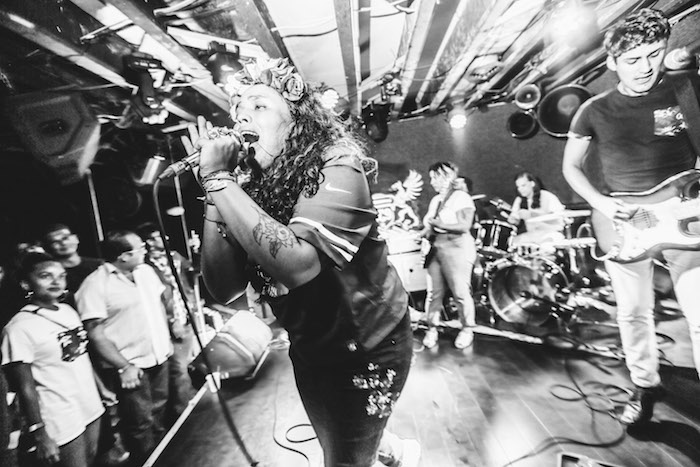
The Downtown Boys
KC: Having a “working role” is kind of a coping mechanism.
Farrah: That support is great because it keeps a scene going, but…
KC: There’s also this idea of “shitwork”.
Kit: Shitwork is, a lot of times, what actually keeps things functioning, but it’s basically behind the scenes and is [usually] thankless, not the spotlight.
KC: But then it becomes more important for bands like us to exist. Beginning with shitwork, I guess, what are other social issues that we think are important to focus on in the current moment? One of the things Farrah said recently was about the idea that “punk got good again as soon as Trump got into office” being utter nonsense…
Farrah: It is nonsense. The bands that people have been excited about the past few years who have something important to say -- like G.L.O.S.S. and Pure Disgust and Downtown Boys -- they have existed and have had important things to say before this. We were already dealing with black and trans folks losing their lives way too often in a previous administration, we were already dealing with mass deportation, and racism, and it’s like “all of a sudden this man and his wig are here and now we’re mad.” Now maybe some white dudes will care a lot and write a song about how Nazi’s are bad.
[Laughter]
KC: The things that stay on my mind are like: safety and decriminalization for sex workers, structural racism... the opioid crisis tearing communities apart across the country. What takes up your mental space?
Farrah: For me it goes back to why I feel like it’s important for me to play music, or have my camera. People get erased from their own histories all of the time. So much harm is done when people are erased from a narrative. That’s how people in power are able to manipulate people's hearts and minds. If you can erase somebody, you can do some really awful damage.
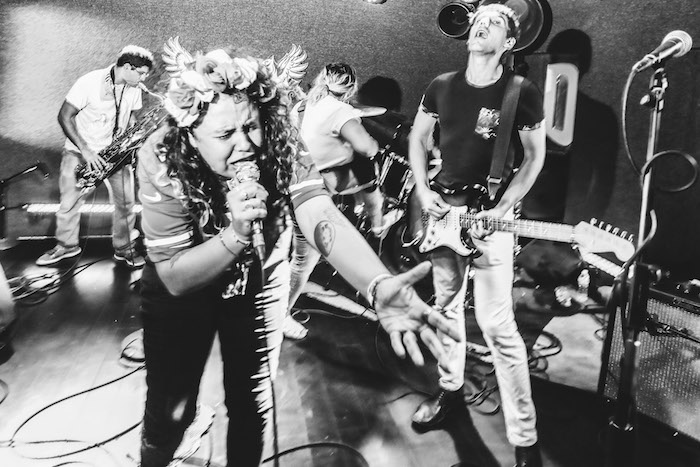
The Downtown Boys
KC: Yes! That’s why it’s like: support marginalized communities who are trying to assert their own existence constantly. Speaking of, what is everyone working on, project-wise?
Josh: I just finished a Troma movie, so that’ll come out in the fall. Trying to book drag around town at places that don’t usually do it. In the last year especially, Gay Bash has brought out a lot of the weirdo queer artsy queens and now we’ve kind of got our own sub-scene that’s really cool. There’s all of these people who want something new and something different and now everyone is finally coming out. Some of it is a reaction to Trump and the fact that all phobias are on the rise again and it’s kind of scary, but it’s like, people are getting angry and getting a little more outrageous. Being louder knowing that people are pushing back against it comes a little more naturally to me from growing up super flamingly gay as a child in Texas. It is strange now that I have felt those same fears as I did as a child, here. The climate in DC has changed quite a bit.
Farrah: I’m working on a DC punk photo book and it will come out when I finish it. It’s mostly done. I’ve been shooting the past 5-6 years.
KC: I’ve been working on some weird art films and music vide- type stuff. It’s a variety of smaller projects. Trying to do more underwater videography, and toying with the idea of doing a longer independent documentary. I want to focus on growing up in the punk community and how that informs activism -- specifically with women. A lot of us embrace activism and I’m interested in exploring the ways in which people become servants of their communities.
Kit: Trying to put together a few backyard benefit shows for the summer! Hangin’ out with dogs, being the homemaker, living that dream.
Josh: Heteronormative.
[Laughter]
